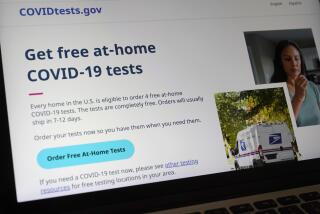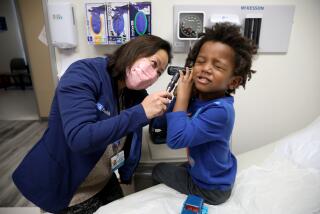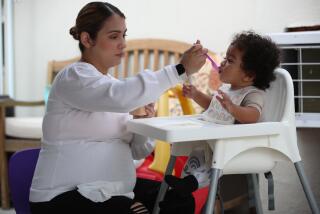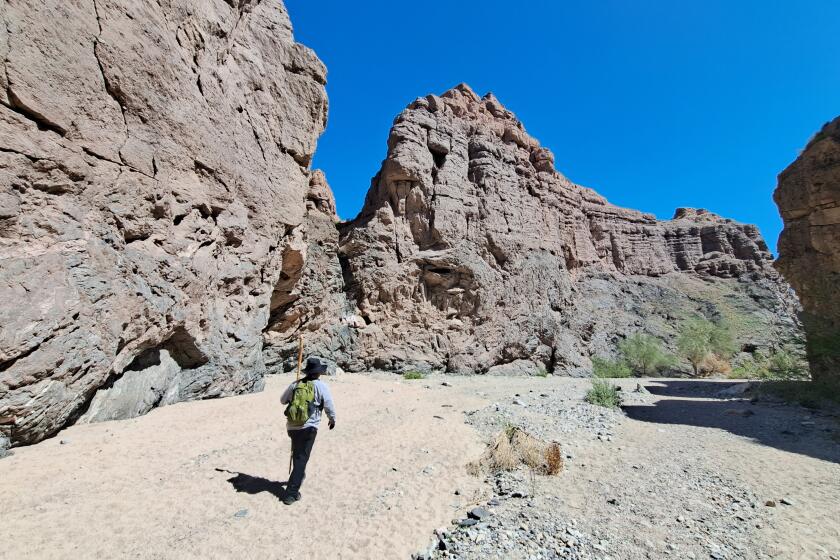California child-care workers struggle with COVID-19 test kit shortages
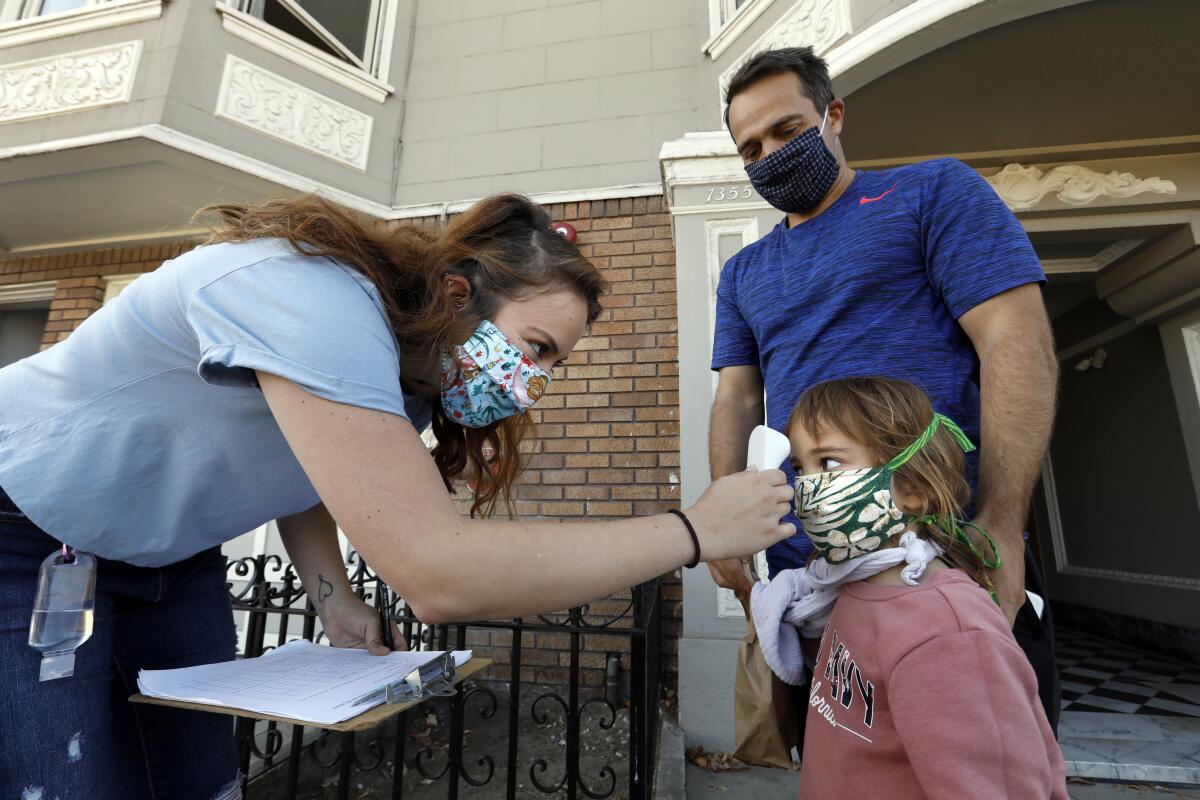
Child-care providers serving California’s low-income families are scrambling to purchase rapid COVID-19 tests while banking on the state to boost their supply, hoping more frequent testing can prevent closures brought on by exposures to the virus.
But what the state has to offer child-care providers — many of whom offer government-subsidized care out of their own homes — is not nearly enough to cover demand in the face of a national shortage.
The state sent 100,000 test kits to child-care providers this week, according to Gov. Gavin Newsom’s office. There are an estimated 1 million child-care slots in the state, including private and subsidized care, and more than 175,000 staff, according to Alexa Frankenberg, executive director of Child Care Providers United.
“While that is a good start, it covers only a fraction of the workforce and children in care for just one test,” Frankenberg said. “And at this point is insufficient to address the multiple exposures that most child cares have faced during this surge.”
Newsom spokesperson Erin Mellon said Wednesday that the state “continues to make every effort to secure as many test kits as possible and will disseminate these as quickly as possible to child-care facilities as additional inventory becomes available.”
The call for tests comes after Newsom purchased more than 9 million rapid tests earlier this month for K-12 schools in light of an Omicron surge.
Day-care closures continue to happen across the state, setting off a ripple effect that not only affects the income of providers — who are predominantly women of color — but that of their clients, as parents must forgo a work shift because of a sudden loss of child care.
Meanwhile, some children may be forced into unsafe temporary care due to disruptions, child advocates warn.
The federal government’s COVID-19 test kit plan that launched this week through the U.S. Postal Service offers four free tests per household, but child-care workers like Zoila Toma care for dozens of children out of their home.
Toma reopened her Long Beach day care on Tuesday, after closing for five days because her school-aged son tested positive for COVID-19. She was working alone, and her assistant was out sick.
Toma has been scouring store shelves for rapid tests and paying for them out of pocket, giving them away to her clients. She said she goes to free local testing sites when she can, but PCR results take longer.
She earns about $30,000 a year after costs such as food and diapers are accounted for, she said.
“Tests should have happened way before this,” said Toma, a member of Child Care Providers United. “The state is not learning from everything we’ve been going through the last two years.”
The state sent “the last batch” of the 100,000 test kits out on Tuesday to local agencies that will then distribute them to providers, Mellon said. The state set a goal to get 100,000 kits out by the end of January, Mellon said. For now, it’s unclear how many more tests the state can or will provide to child-care providers in light of the shortage.
The governor’s office pointed to a slew of investments in child care in recent years, including more than $779 million in last year’s state budget for additional subsidized child-care slots.
The state gave $600 stipends to providers for every subsidized child they serve as part of pandemic-related negotiations last year. In addition, all licensed child-care providers in the state received one-time stipends up to $6,500.
Newsom, who has touted early childhood education as a priority of his administration, signed a law in 2019 that gave child-care workers the right to unionize and collectively bargain with the state, given their pay is based on state reimbursements for care. The union met with state officials this week to discuss COVID-19 provisions, with providers raising concerns about testing and the effect of closures.
“Testing is an important part of our effort to minimize spread but it’s not the only tool — masks and vaccinations remain key to minimizing the spread of COVID,” Mellon said. “The state’s efforts around additional PPE/testing are meant to be additive to the existing programs that locals have in place.”
But providers say the governor’s big-picture investments don’t address their immediate testing problem.
Jacqui Banta, chief operating officer for the Children’s Resource & Referral of Santa Barbara County, requested about 12,000 test kits from the state. On Wednesday, she received 720 kits; it is not clear if she will get any additional supplies.
Banta acknowledged that the shortage isn’t exclusive to California and is a national problem, but she is hoping for guidance on how to decide which programs receive the tests, since there are not enough to accommodate all children in care.
“Across the county, we’re seeing unfortunate closures due to exposures that could potentially not be closures if there was access to tests,” Banta said. “It’s really hard to navigate as a provider. If we had tests, then a child who is teething who happens to have a runny nose doesn’t have to be sent home. And a child who is positive but may have minor symptoms wouldn’t be unknowingly exposing other children.”
The state is providing child-care workers who offer subsidized care 16 additional paid nonoperational days through June, allowing them to still be reimbursed if children don’t attend because of the virus. But some providers are skeptical that will be enough.
While there are signs that the Omicron surge is leveling off, California continues to see alarmingly high hospitalizations.
Young children, who make up the majority of those in day care, are still not eligible for the vaccine. Toma’s day care, for instance, serves children as young as 7 months.
The state has advised child-care workers to send the tests home with children and not to test them on-site.
Even with a recent infusion of tests from the Los Angeles County Department of Public Health, providers are still struggling, said Cristina Alvarado, executive director of the Child Care Alliance of Los Angeles.
Alvarado requested 40,000 test kits from the state. She is set to receive 15,000 this week, she said. Alvarado said Thursday the state told her more are coming.
In Los Angeles County, where 58,000 children receive subsidized child care, the supply has so far been just “a drop in the bucket,” Alvarado said.
About half of children in Los Angeles programs are also enrolled in school, which means they could have access to tests on campuses, but even then, the gap is too large, she said.
The state struggled to get tests to 6 million school students before they returned to campuses after winter break, with Newsom’s office blaming snowstorms and supply chain woes for the delays.
Alvarado said that child-care centers should have been prioritized sooner along with schools.
“Test kits are still very, very slow to come to child care,” she said. “The state could have included the early child-care system when they were giving out test kits for school districts, but I don’t think they had enough. Providers with little ones that are not in school should be made a priority. It makes the most sense.”
More to Read
Start your day right
Sign up for Essential California for news, features and recommendations from the L.A. Times and beyond in your inbox six days a week.
You may occasionally receive promotional content from the Los Angeles Times.
